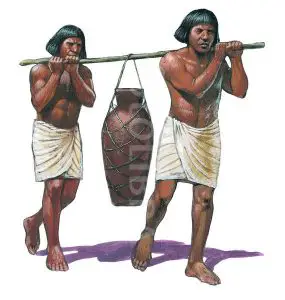Egyptian Slavery had its roots in ancient civilizations including the Egyptian. Slaves constituted the lowest layer of the social pyramid. Wars were common in the ancient world and prisoners of war were gradually turned into slaves.

But one could also become a slave on account of his inability to pay his debts. Egyptian Slavery was the direct result of poverty. Voluntary servitude also existed where women offered herself to the temple.
Slaves were also acquired through inheritance. Treating a slave well was a moral duty. Though slaves were not happy like the other social classes, they were not persecuted as we may presume.
Slave children were brought up well by the owner of the slave according to accounts of the 18th century. Some slaves could achieve higher positions in the society if they had the skills and abilities. Slaves were often tattooed to mark their status.
Prices of Egyptian Slaves
Hem (Hm), generally translated as ‘slave’ and originally meaning body, was seemingly a person with lessened rights.The prices of slaves varied over time. During the 25TH dynasty, the average price was about 2.9 debens. But their price could be as low as 20 kits of silver.
Prices were again dependant on their abilities and the uses they were going to be put to.
Many slaves labored on the estates of the pharaohs, the nobility, and the priests. The master might employ a slave in many different manners, such as in domestic service as the guardian of children, cooks, brewers or maids.
They might be used as gardeners or field hands or in the stable. They were sometimes made to work in quarries and mines. Many monuments in ancient Egypt like the pyramids were built by slaves.
However, it is assumed that there was no slave market in Egypt. Rather, individual dealers seem to have approached their customers personally. The transaction was evidenced by commercial documents, executed before officials or a local council, that contained clauses usually used in the sale of valuable commodities.
Egyptian slaves were also known to have been executed to accompany their deceased Pharaoh into the afterlife. Fleeing was not easy for a slave. If they tried to escape, they were captured and put to punishment. But sometimes, slaves were often set free by the masters themselves.
